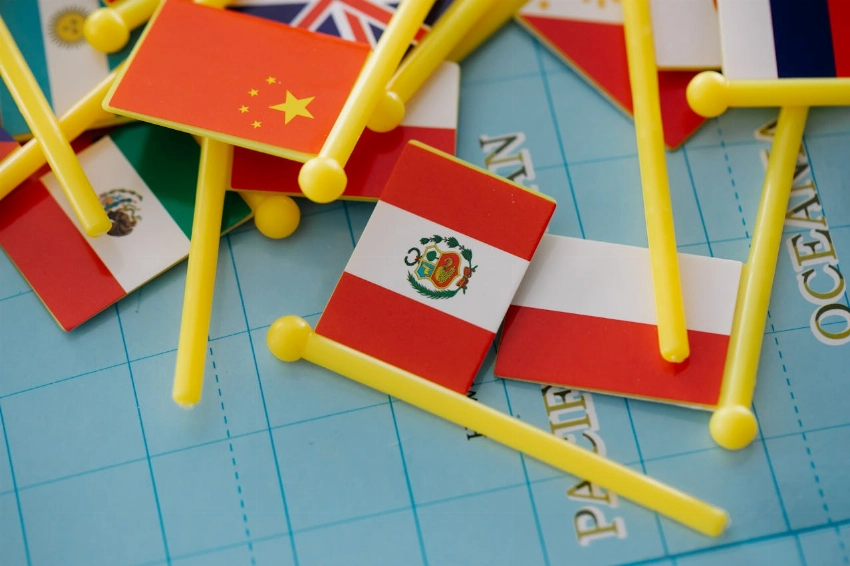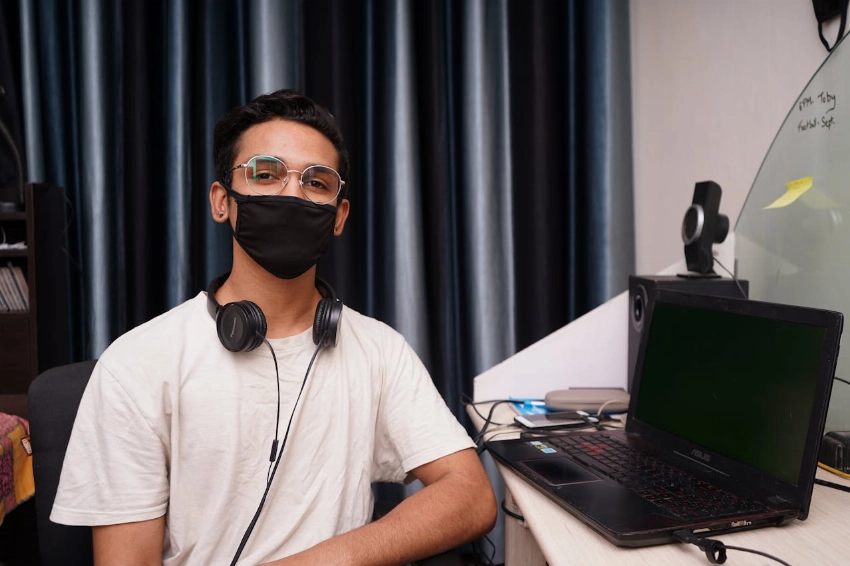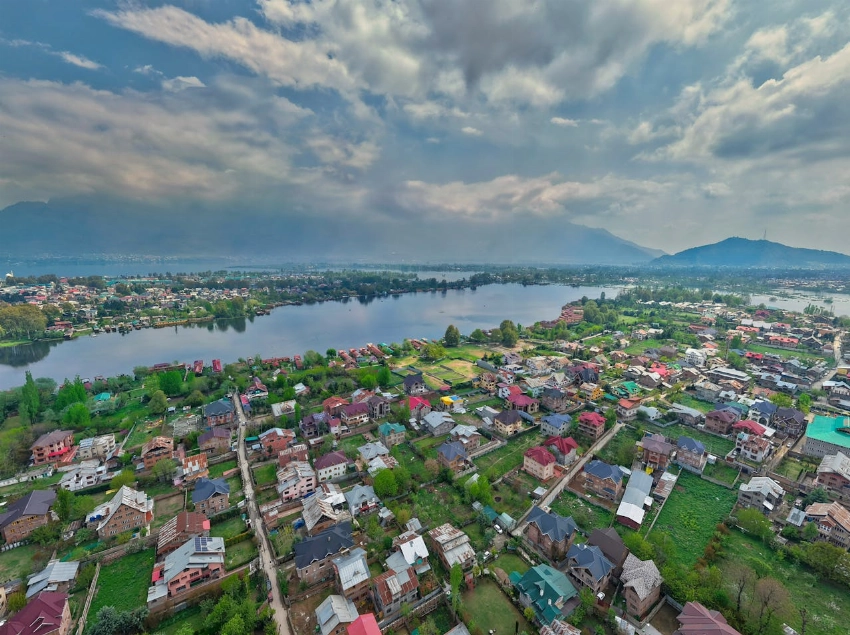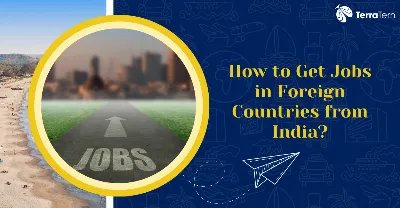Key Highlights
- How to Get Jobs in Foreign Countries from India in 2025?
- Why Should Indians Consider Working Abroad in 2025?
- What Are the Top Countries Hiring Indian Professionals in 2025?
- Which Industries Offer the Best International Job Opportunities for Indians in 2025-26?
- What Is the Step-by-Step Process to Get Jobs in Foreign Countries from India?
- What Are the Eligibility Requirements to Work Abroad from India in 2025-26?
- How Do Work Visas and Permits Function for Indians Going Abroad?
- What Salary Can Indians Expect When Working Abroad?
- What Challenges Do Indians Face When Working Abroad?
- How Can Freshers Get Jobs in Foreign Countries from India?
- Which Job Portals and Resources Help Find International Jobs for Indians in 2025-26?
- What Tips and Strategies Ensure Success in Getting Foreign Jobs?
- How Can TerraTern Help You Secure Jobs in Foreign Countries?
- Global Job Market: Trends, Opportunities, and Breakthroughs for Indian Professionals in 2025
- Conclusion
Learning how to get jobs in foreign countries from India is no longer far-fetched, as 2.5 million Indians work abroad every year. This extensive guide explodes the entire process of application, countries hiring people, industries which are hiring people, demand sectors (IT, Healthcare, Engineering, Finance), requirements of visas, salary due us (2-8 times salary in India) to networking and the trends of hiring in the job market in 2025 to make you a more successful candidate for your abroad job!
How to Get Jobs in Foreign Countries from India in 2025?

To secure Indian employment in foreign countries using this holistic method, follow this successful 5-step process:
-
Assess target countries based on your skills, best countries include the USA, Canada, Germany, Australia and the UAE, with good visa policies for Indian professionals
-
Build internationally recognised qualifications with certifications and credentials that follow international standards in your industry.
-
Build a competitive profile by optimising your resume and LinkedIn with relevant keywords and achievements for international recruiters.
-
Apply selectively on verified international job portals such as LinkedIn, Indeed, Glassdoor and country-specific portals towards specific targeted sectors such as IT (Software development, AI), Healthcare (nursing, medicine), Engineering and Finance.
-
Obtain a secure work visa after being offered a job - 2-6 months processing time, with the sponsor of the job application being your employer.
-
Utilise networking and professional ties in other countries when doing salary research (2-8x Indian compensation) to avoid being undervalued.
Also Read: How to Get a Job Abroad from India? Experts Guide
Why Should Indians Consider Working Abroad in 2025?
Indians should consider working in other countries for much higher salaries (2-8x Indian compensation), global career experience, work-life balance, availability of latest technology, faster career growth and paths for permanent resident visa in developed countries.
-
Fast career development due to exposure to new cutting-edge technologies, international best practices and leadership opportunities outside the saturated Indian markets
-
Superior quality of life, including world-class healthcare systems, better infrastructure, cleaner environment and top-tier education options for the children
-
Improved work-life balance as opposed to conventional 35-40 hour work weeks, mandatory paid leave (20-30 days per year), and better protection of employees over and above the Indian demanding work culture
-
Global skill development in working in different international teams, having access to state-of-the-art training programs and the development of valuable cross-cultural professional networks
-
Timed paths to permanent residency for countries no longer in need of asylum, such as Canada, Australia and Germany, that have clear routes to citizenship, social security benefits and long-term stability for a family*
-
Higher earning potential--professionals learning how to get jobs in foreign countries from india can earn 2x-8x their current salary. 17 IT-Stars in USA earn $80,000 - $150,000 vs 5-12 lakhs domestically.
-
Improved work-life balance with conventional 35-40 hour work weeks, compulsory paid leave (20-30 days per year), and better employee protection laws over and above the Indian demanding work culture
Expert Takeaway: Working abroad isn't just about higher salaries—it's a strategic career investment that offers exponential growth in skills, network, and long-term financial security that compounds over decades.
What Are the Top Countries Hiring Indian Professionals in 2025?

Understanding how to get jobs in a foreign country from India involves using the countries that require skilled workers. The following is a complete comparison of the top 10 countries:
|
Country |
Visa Type |
Primary Industries |
Average Salary Range |
Processing Time |
Immigration Ease |
|
USA |
H-1B, L-1 |
IT, Software Development, AI, Engineering |
INR 72 lakh - INR 1.37 crore ($87,000-$166,000) |
3-6 months |
Moderate (lottery system) |
|
Canada |
Express Entry, PNP, LMIA Work Permit |
IT, Healthcare, Engineering, Finance |
INR 40-86 lakh (CAD 49,000-105,000) |
19 weeks |
High (PR pathway) |
|
Germany |
EU Blue Card, Skilled Worker Visa |
IT, Engineering, Healthcare, Manufacturing |
INR 40-80 lakh (€45,000-90,000) |
4-12 weeks |
High (90,000 visas annually) |
|
Australia |
Skilled Migration, TSS 482 |
IT, Healthcare, Construction, Engineering |
INR 55-70 lakh (AUD 67,000-104,000) |
2-6 months |
High (points-based) |
|
UAE |
Employment Visa, Golden Visa |
IT, Finance, Engineering, Healthcare |
INR 25-75 lakh (AED 84,000-252,000) |
2-4 weeks |
Very High (no sponsorship transfer restriction) |
|
UK |
Skilled Worker, Young Professionals |
Tech, Finance, Healthcare, Engineering |
INR 38-55 lakh (£35,000-52,000) |
3-8 weeks |
Moderate (post-Brexit rules) |
|
Singapore |
Employment Pass, S Pass |
Finance, IT, Engineering, Pharmaceuticals |
INR 45-65 lakh (SGD 67,000-98,000) |
3-8 weeks |
Moderate (salary thresholds) |
|
Netherlands |
Highly Skilled Migrant |
Tech, Engineering, Finance, Life Sciences |
INR 60-74 lakh (€66,000-73,000) |
2-4 weeks |
High (English proficiency) |
|
New Zealand |
Skilled Migrant Category, Essential Skills |
IT, Healthcare, Engineering, Construction |
INR 40-60 lakh (NZD 60,000-90,000) |
3 weeks - 4 months |
High (clear PR pathway) |
|
Ireland |
Critical Skills Permit, General Permit |
IT, Pharma, Engineering, Finance |
INR 48-58 lakh (€52,000-58,000) |
4-8 weeks |
High (tech hub, English-speaking) |
How Do USA Job Opportunities Compare for Indians?
The USA continues to be one of the most desirable places in the world for Indians interested in how to get jobs in foreign countries from India, in spite of competitive visa processes and the latest fee increases.​
|
Factor |
Details |
|
Visa |
H-1B (lottery system, 65k-85k cap annually) |
|
Top Sectors |
IT, Engineering, Healthcare, Finance |
|
Avg. Salary |
$50,000–$120,000 (INR 42–100 lakh) |
|
Hiring Companies |
Microsoft, Google, Amazon, Apple, Facebook |
|
Processing Time |
3-6 months |
|
PR Pathway |
H-1B → PERM/Labor Certification → Green Card (multi-year wait) |
Why Is Canada the Best Option for Long-Term Settlement for Indians?
Canada provides the most clear way for Indians to learn how to get jobs in foreign countries from India, with permanent residency being the major objective.​
|
Factor |
Details |
|
Visa System |
Express Entry (CRS points), Provincial Nominee Programs (PNPs) |
|
Top Industries/NOC |
IT, Healthcare, Engineering, Finance (NOC 2173, 2147, 3012, etc.) |
|
Avg. Salary |
CAD 40,000–90,000 (INR 25–60 lakh) |
|
PR Pathway |
Fast track (1–3 years) via EE/PNP |
|
Immigration Policies |
Family-friendly, dependent visa, universal healthcare, free education |
What Makes Germany Attractive for Indian Engineers?
Germany has increased the approval of visas for Indians by many folds and has become one of the easiest European countries to travel to for those looking at how to get jobs in foreign countries from India.​
|
Factor |
Details |
|
Visa System |
EU Blue Card, Job Seeker Visa, Skilled Immigration Act |
|
Avg. Salary |
€40,000–€70,000 (INR 36–64 lakh) |
|
Benefits |
Free healthcare/education, English jobs available, subsidised transport |
|
PR Pathway |
Work 33 months on Blue Card → PR (can reduce to 21 months with B1 German proficiency) |
Which Gulf Countries Offer Tax-Free Income for Indians?
Gulf countries offer the best take-home pay to Indians, with the ability to master the art of working in foreign countries from India with zero income tax policies.​
|
Country |
Avg. Salary |
Top Sectors |
Visa Requirements |
Proximity to India |
|
UAE |
AED 8,000–25,000 (INR 2.1–6.6 lakh/month) |
IT, Engineering, Finance, Oil & Gas |
Employer sponsorship, quick processing (2-4 weeks) |
3-4 hours |
|
Saudi Arabia |
SAR 6,000–20,000 (INR 1.3–4.5 lakh/month) |
Oil & Gas, Construction, IT |
Employer sponsorship needed, regulated quotas |
4-6 hours |
|
Qatar |
QAR 7,000–20,000 (INR 1.6–4.3 lakh/month) |
Hospitality, Construction, IT |
Quick employer sponsorship |
4-6 hours |
|
Oman |
OMR 700–2,000 (INR 1.5–4.3 lakh/month) |
Oil & Gas, Engineering, Hospitality |
Employer sponsorship is an easy process |
3-4 hours |
Key Notes: Choose your destination country based on long-term goals—Canada and Australia for PR, USA for the highest salaries, Germany for work-life balance, and the Gulf countries for tax-free earnings and proximity to home.
Also Read: Employment Visa India: New Guide to Process, Salary & Costs
Which Industries Offer the Best International Job Opportunities for Indians in 2025-26?
Understanding how to get job in foreign countries from India, one must start by identifying high demand industries. The following industries provide great opportunities with good salaries and high growth potential till 2030:
|
Industry |
Job Roles |
Required Skills/Certifications |
Salary Range (Annual) |
Demand Drivers |
Growth Projection (2025-2030) |
|
Information Technology |
Software Engineer, Data Scientist, AI/ML Specialist, Cybersecurity Expert, DevOps Engineer, Full Stack Developer |
Python, AWS, DevOps, TensorFlow, Cloud Architecture, Java |
$50,000-$175,000 (INR 42-1.47 crore) |
Digital transformation, AI adoption, cloud migration |
AI/ML: 85%, Big Data: 110%, Software Dev: 60% |
|
Healthcare & Nursing |
Registered Nurse, General Practitioner, Specialist Doctor, Allied Health Professional, Elderly Care Nurse |
Nursing Degree (BSc/MSc/GNM), NCLEX-RN, German B1/B2, IELTS, State Registration |
$45,000-$120,000 (INR 38-1 crore) |
Ageing populations, healthcare worker shortages, and post-pandemic demand |
Nursing: 25-30%, Care Economy: significant growth |
|
Engineering |
Civil Engineer, Mechanical Engineer, Electrical Engineer, Petroleum Engineer, Construction Manager |
PMP, PE License, AutoCAD, SOLIDWORKS, Project Management |
$37,000-$113,000 (INR 31-95 lakh) |
Infrastructure development, renewable energy projects, oil & gas expansion |
Construction roles: 15-20%, Renewable energy: 40% |
|
Finance & Accounting |
Financial Analyst, Investment Banker, Chartered Accountant, Risk Manager, Tax Consultant, FinTech Specialist |
ACCA, CPA, CFA, IFRS Knowledge, Financial Modelling |
$60,000-$150,000 (INR 50-1.26 crore) |
IFRS compliance, cross-border taxation, ESG reporting, fintech growth |
FinTech Engineers: 95%, Financial Advisors: 20% |
|
Teaching & Education |
ESL Teacher, STEM Subject Teacher, Special Education Teacher, IB/IGCSE Teacher, University Lecturer |
Bachelor's in Education, TEFL/TESOL/CELTA, Subject Expertise, 2-3 years experience |
$24,000-$66,000 (INR 20-55 lakh) |
STEM education demand, English language learning, and international schools expansion |
Education Teachers: 35%, STEM focus: high demand |
Why Is IT the Most In-Demand Sector Globally?
The Highest Demand Sectors in the World are as follows
-
Key Areas: Software Development, cloud computing, AI/ML, and cybersecurity are in high demand across the world
-
Top Employers: Facebook, Google, Amazon, Netflix, Microsoft, SAP and the large European tech companies.Skills/Certifications: Being good at Python, Java, AWS, Azure, Kubernetes, TensorFlow, certifications like AWS Certified Solutions Architect, CISSP, etc.
-
Salary Range: Freshers' salaries range from $50 thousand - $70 thousand a year; specialists in the field with experience range from $120 thousand - $175 thousand.
-
Remote Opportunities: Flexible and completely remote positions are available with many companies the world over, and are making jobs more accessible to Indian professionals.
How Can Healthcare Professionals Find Jobs Abroad?
Healthcare Professionals who Get Employment Abroad are as follows
-
Nursing: In high demand in Canada, the UK, Australia, and Germany; Requires a Nursing and Social Work Curriculum. Throughout all countries, the requirements are: NCLEX, OET/IELTS and Local Licensing.
-
Doctors: License Required Through Local Exams (USMLE in the USA, PLAB in the UK). Telemedicine Is Growing
-
Allied Health: Physiotherapists, Lab technicians, and Radiographers are sought after internationally.
-
Certifications: Language (OET, IELTS), nursing (registration), and medical board.
-
Salary & Benefits Nurses: $45,000 - $90,000, Doctors - $90,000 - $150,000 and Healthcare benefits.
What Engineering Roles Are Most Sought After Internationally?
The engineering roles that are most sought after are:
-
Top Jobs: Over NY, Civil, mechanical, electrical, petroleum Engineering; infrastructure project managers.
-
Demand Drivers: Urban Development, Renewable energy, Oil & gas expansion
-
Qualifications: Bachelor's/Master's in engineering and PMP certification, along with a PE license.
-
Top Countries: It should be noted that this ranking relies on the knowledge level of people about policy in both developed countries, such as Germany, the USA and Australia and developing countries, such as Canada, the UAE, etc.
-
Salary: $37,000-$113,000 based on levels of expertise and geographic location.
Which Other Sectors Have Strong Demands in 2025?
-
Finance & Accounting: Roles such as CA, CPA, CFA, which are known worldwide, and services are mostly preferred in capital centres and fintech hubs.
-
Teaching & Education: ESL, STEM Teachers are wanted, particularly in the Middle East, East Asia, and Europe.
-
Hospitality & Tourism: Emerging industries, Gulf regions, Europe, North America.
-
Sales & Business Development: Key to global market expansion.
-
Skilled Trades: Electricians, plumbers, and chefs are in short supply in Europe, Australia, and New Zealand.
As per our expert Shreya, IT professionals have the easiest pathway abroad with remote options, while healthcare workers enjoy the fastest immigration processing and highest job security globally.
What Is the Step-by-Step Process to Get Jobs in Foreign Countries from India?

Step-by-step process to get Jobs in Foreign Countries from India is as follows:
1. Self-Assessment & Goals for the Career
-
Timeline: 1 week
-
Checklist: Skills/experience/ career goals / preferred countries/sectors
-
Tips: Ensure that goals align with global market requirements; do not rush to make decisions
-
Tools: SWOT Analysis Tools, Career Assessment Tools
2. Country & Industry Research
-
Timeline: 1-2 weeks
-
Checklist: See visa policies of research destination, job market, and salaries paid on average; cost of living
-
Tips: Target countries that have good immigration norms for Indians
-
Tools: Immigration websites from the government, LinkedIn job trends, and salary websites
3. Improvement of Skills & Certification
-
Timeline: 1-3 months (concurrent with other steps too)
-
Checklist: Get industry-relevant certifications (AWS, PMP, NCLEX, CPA)
-
Tips: Target certifications- internationally recognised
-
Tools: Coursera, Udemy, EdX, professional bodies
4. Optimising Resume & Profile
-
Timeline: 1 week
-
Checklist: ATS-friendly resume, Update LinkedIn, Targeted cover letters
-
Tips: Keyword-rich resumes that are in line with job descriptions
-
Tools: Jobscan, Grammarly & LinkedIn profile analysers
5. Job Application Through Numerous Channels
-
Timeline: 1-3 months (ongoing)
-
Checklist: Applying on portals (LinkedIn, Indeed, Glassdoor), Company Websites, Recruitment Agencies
-
Tips: Customise applications, Track submissions
-
Tools: Job Portal, Applicant Tracking spreadsheets, LinkedIn Sales Alert
6. Interview Preparation & B Networking
-
Timeline: 1-4 weeks
-
Checklist: Have technical and HR interviews. Practice Building a professional network
-
Tips: Organise yourself into expat and professional organisations for insider information
-
Tools: Interview simulators, Meetup, Professional forums
7. Job Offer Negotiation
-
Timeline: 1 week
-
Checklist: Evaluate offers, Negotiate on salary and benefits, Clarify Contract
-
Visit: Not-negotiated contract on he contract terms
-
Tips: Find out what is paid in the market; have offers on writing
-
Tools: Salary benchmarking tools, guides for negotiation
8. Application for Visa & Documentation
-
Timeline: 1-3 months
-
Checklist: Gather documents, Apply for work visa, Schedule Biometrics/ Interviews
-
Tips: Start early; get the help of immigration experts if/ when needed
-
Tools: Ambassador's websites, visa assistance
This defined workflow helps in how to get jobs in foreign countries from India effectively and efficiently. This structured workflow aids in getting jobs in foreign countries from India efficiently and effectively.
Step 1 - How Do You Assess Your Career Goals and Readiness
Conduct a self-evaluation of your skills/experience/career goals.
-
Use a skills inventory checklist to identify skills weaknesses and strengths as these relate to international jobs.
-
Consult your financial preparation, including visa costs, moving costs, living costs abroad, etc.
-
Consider family and personal factors such as dependents, support systems, willingness to relocate, etc.
-
Plan a timeline that is realistic, based upon what you want to achieve and can afford to pay.
-
Avoid some of the more common mistakes like rushing to decision-making or not planning financially.
Step 2 - How Should You Research Target Countries and Industries?
-
Pick countries based on features such as ease of visa application, strength of the job market and cost of living.
-
Study the industry's demand using government labour market reports, job portals, etc.
-
Explore official immigration and employment websites for current visa and job listings information.
-
Analyse information from the labour market on average salaries and how the sector is predicted to grow.
-
Assess cultural fit in terms of language, work culture and lifestyle compatibility.
-
King to use primary and verified sources for correct data on how to get jobs in foreign countries from India.
Step 3 - What Skills and Certifications Do You Need?
-
Identify specific certifications to the occupation (e.g., AWS, PMP, NCLEX, CPA).
-
Prepare for and gain necessary language proficiency exams such as IELTS, TOEFL or German/French language exams.
-
Upskill with the help of websites like Coursera, Udemy or edX for technical and soft skills.
-
Develop soft skills such as communication, flexibility and intercultural skills.
-
Too bad, last year I was only interviewed for first-year teaching jobs. Too bad last year I only interviewed, so I knew how to do it, for teaching jobs in the first year.
-
Make certification decisions targeted to countries and industries.
Step 4 - How Do You Create an International-Standard Resume?
-
Know the format difference between the US, UK, EU, and other geographical conditions and format accordingly.
-
Optimise your resume in order to be read by Applicant Tracking Systems (ATS) with the use of relevant keywords.
-
Follow global CV best practices - concise results, based on achievements and quantifiable.
-
Leverage your LinkedIn profile with keywords, endorsements and a professional photo.
-
For techs, it's a portfolio, GitHub repo.
-
Customise resumes for each job application so as to improve the chances of selection.
Step 5 - Where Should You Apply for International Jobs?
-
Utilise international job boards such as LinkedIn, Indeed, Glassdoor and Monster.
-
Explore country-specific platforms such as Canada Job Bank or in Australia, SEEK.
-
Use on the company career website for targeted multinational companies by direct application.
-
Get recruitment agencies that specialise in international placements.
-
Utilise professional networks and alumni for referrals as well as inside information.
-
Have a history of application tracking with spreadsheet or job tracker tools.
Step 6 - How Do You Prepare for International Job Interviews?
-
Practice virtual interview etiquette, such as a good audio/video setup and background.
-
Manage the time zone differences in order to schedule the interviews at the best time.
-
Understand Cultural Differences in Interviews- Formality, Questions and Communication.
-
Prepare answers to common international interview questions using the STAR method.
-
Develop salary negotiating strategies based on research on the market.
-
Following up with thank you emails in a professional way after each interview.
Step 7 - What Happens After Receiving a Job Offer?
-
Check the authenticity and details in the offer letter very carefully.
-
Negotiate salary, benefits and relocation assistance, if needed.
-
Go over the terms of the contract, such as probation, working hours, and termination clauses.
-
Relocation packages like housing and travel are subjects of discussion.
-
Manage notice period, india professional, the smooth transition
-
Seek legal or consulting advice if in doubt about the terms of contracts.
Step 8 - How Do You Apply For a Work Visa?
-
Be familiar with the visa application in your destination-specific country.
-
Gather all needed documents such as job offer, education certificates, passport, etc.
-
Undergo mandatory medical exercises and obtain clearance certificates from the police.
-
Submit a visa application through the Embassy or the Recognised Visa Centres.
-
Track down application processing times and prepare against possible interviews.
-
Remain in touch about the status of the visa, answer questions in a timely manner and plan your travel after
Pro Tip: Success in getting foreign jobs requires systematic planning—start your preparation 6-12 months before your desired departure date to allow adequate time for certifications, applications, and visa processing.
Also Read: Nursing Jobs in Germany for Indian Nurses: Vacancy
What Are the Eligibility Requirements to Work Abroad from India in 2025-26?
Requirements to be Eligible to Work Abroad from India:
Educational Qualification
-
A minimum bachelor's degree is required for most countries, but diplomas and certifications are accepted in some areas of study.
-
Educational credential evaluation may be required in countries such as Canada, Australia and Germany in order to verify authenticity and equivalency.
Work Experience
-
1-3 years of relevant work experience preferred, though some countries and sectors have fresher opportunities too, especially in IT and Healthcare.
-
Experience should be in relation to the targeted job role and well-documented in the CV and reference letters.
Language Proficiency
-
English language Tests such as IELTS (minimum 6.5 generally), TOEFL, or mainly country-specific Language exams (ex, German B1/B2, French DELF, etc); compulsory depending on destination.
-
Language scores affect point-based eligibility for immigration and suitability for work.
Age Limit
-
Most point-based immigration systems favour immigrants below the age of 45, with some flexibility to priority sectors.
-
Younger candidates will usually perform better on immigration points systems.
Valid Passport & Clean Criminal Record
-
A valid Indian passport having a validity of up to 6 months more than the dates of intended travel is compulsory.
-
Police clearance certifications and academic checks are required as part of a visa application.
Health Requirements
-
Selected athletes must undergo medical exams to prove general health and fitness. Specific countries may have other vaccination/health screening requirements.
These universal conditions are the core criterion for effectively getting jobs in foreign countries from india. Specific countries may have further requirements based on their immigration policy.
Expert Takeaway: While requirements vary by country, investing in recognised international certifications and language proficiency tests significantly increases your chances of meeting eligibility criteria across multiple destinations.
How Do Work Visas and Permits Function for Indians Going Abroad?

A work visa is an official authorisation to work legally in a foreign nation for a limited period of time, while a work permit is frequently called for permission to work granted after arriving in the country or as a condition of a visa.
-
Major types of visas are employment visas (for skilled workers), Skilled Worker visas, Intra-Company Transfer visas, and Temporary Work Permits.
-
Countries, the types of visas range from the USA with H-1B, Canada with Express Entry-linked work permits, Germany's EU Blue Card, to Employment/Residence visas normally sponsored by employers in the countries of the Middle East.
-
Processing times vary from 2 to 12 weeks (depending on the country and type of visa, as well as completeness of application). Costs vary enormously, including fees, biometrics and medicals, from $150 to $1000 or more.
-
Employer sponsorship is required in most countries, with the condition of having a valid job offer, contract and in some cases a labour market test to demonstrate that there is no local candidate.
-
Visa validity and visa renewal vary according to destination - most visas last between 1 and 3 years, with renewals or transition to permanent resident status depending on immigration policies in various countries.
-
These points form the fundamental foundation of the way to get jobs in foreign countries from India with legal work authorisations.
What Documents Are Required for Work Visa Applications?
Documents Are Needed for Work Visa Applications
-
Valid passport with at least 6 months beyond the intended stay;
-
Employer Offer of Job or Contract with Specific Details
-
Educational qualifications/professional certifications (attested/apostilled).
-
Language proficiency test results (IELTS, TOEFL, etc) as required.
-
Police clearance certificate + medical examination reports
-
Translations of documents in the official language of the destination country, in case of need
How Long Does Work Visa Processing Take by Country?
Work visa processing times per country are:
|
Country |
Processing Time |
Expedited Option |
Factors Affecting Speed |
|
USA |
3-6 months |
Premium Processing |
Application completeness, quota |
|
Canada |
8-20 weeks |
Priority Processing |
Country of application, workload |
|
Germany |
4-12 weeks |
- |
Language certificates, document verification |
|
Australia |
30-90 days |
Priority Processing |
Occupation list, case complexity |
|
UAE |
2-4 weeks |
- |
Employer vetting, visa type |
Can You Change Jobs After Getting a Work Visa?
Some countries (Canada, Germany, Australia) have the rule of visa portability, which means you can change your job and not have your visa cancelled.
-
Others (USA H-1B) will require new employer sponsorship and a visa transfer petition filing.
-
Always check if your visa is an employer-tied (restricted) or an open permit.
-
Notify the immigration authorities as soon as possible in order to keep your legal status for changes of employment.
-
Avoid unauthorised work; violations can lead to cancellation of visa or deportation.
Important Point: Your work visa is typically linked to your initial employer—plan job changes carefully to stay compliant. Maintaining legal status requires understanding your visa conditions and renewal timelines, which are crucial when learning how to get jobs in foreign countries from India.
Also Read: 9 Best Jobs to Settle Abroad from India: Updated
What Salary Can Indians Expect When Working Abroad?
Salary Expectations for Indians Working Abroad in 2025:
|
Industry / Role |
Location |
Entry-Level Salary |
Experienced Salary |
Additional Benefits |
Tax Considerations |
|
IT (Software, AI, Cybersecurity) |
USA/Canada |
$50,000 - $70,000 (INR 42-58 L) |
$80,000 - $150,000 (INR 67-1.26 Cr) |
Health insurance, bonuses, stock options |
USA federal + state tax (15-35%), Canada federal + provincial tax (20-33%) |
|
Europe (Germany, Netherlands) |
€35,000 - €50,000 (INR 30-43 L) |
€50,000 - €80,000 (INR 43-69 L) |
Social security, pension contributions |
Germany taxes up to 45%, the Netherlands ~30% |
|
|
Gulf Countries (UAE, Saudi) |
AED 8,000 - 15,000/month (INR 1.8-3.3 L) |
AED 15,000 - 25,000/month (INR 3.3-5.5 L) |
Tax-free salary, accommodation allowance |
No income tax, but social contributions may apply |
|
|
Healthcare (Nurses, Doctors) |
USA/Canada |
$60,000 - $75,000 (INR 50-63 L) |
$90,000 - $120,000 (INR 75-1 Cr) |
Health benefits, shift differentials |
Similar to IT |
|
Europe (Germany, UK) |
€40,000 - €55,000 (INR 35-48 L) |
€60,000 - €90,000 (INR 53-79 L) |
Pension, paid leave |
Varies, often higher than IT |
|
|
Engineering (Civil, Mechanical, Electrical) |
USA/Canada |
$55,000 - $70,000 (INR 46-58 L) |
$75,000 - $100,000 (INR 63-85 L) |
Bonuses, insurance |
Similar to IT |
|
Europe |
€40,000 - €55,000 (INR 35-48 L) |
€55,000 - €75,000 (INR 48-65 L) |
Social benefits |
Varies by country |
This gives a realistic perspective of the salary for an Indian planning how to get jobs in foreign countries from India, in order to help plan expectations and their negotiation strategies.
How Do IT Salaries Compare Across Different Countries?
The IT salaries comparison in different countries:
-
Entry-level software developers have an income of $50,000-$70,000 in the USA/Canada, EUR35,000 - EUR45,000 in Europe, AED 8,000 - AED12,000/month in Gulf countries.
-
The salary of data scientists ranges between $70,000 $130,000 in North America, and in Europe it is EUR45,000 - 75,000.
-
Cloud architects earn $90,000 - $150,000 in the US/Canada, and EUR55,000 - 85,000 in Europe.
-
Cybersecurity experts earn $80,000 - 140,000 in the USA/Canada, $s$ good pay in Singapore and Europe.
-
With 5-10 years of experience, salaries go up 40-60% with leadership positions exceeding $180,000 in some markets.
-
Certifications and experience which are aligned with these salary benchmarks should be aimed for by Indian IT professionals who are seeking job opportunities abroad from India.
What Can Healthcare Professionals Earn Internationally?
Healthcare Professionals who Earn Awards Internationally are as follows:
-
Registered Nurses (RN) Work in USA/Canada-Euro 40,000-60,000, Gulf countries monthly EUR10,000-18,000 AED 55,000-75,000 Pay for performing RN jobs
-
According to doctors, according to their speciality and country, they get between $90,000 and $180,000 per year.
-
Allied health professionals such as physiotherapists and lab techs make $45,000-$75,000 in Western countries.
-
Common benefits may be health insurance, pension plans, bonuses and shift differentials.
-
Overtime and being called in can be a way to earn much more take-home pay.
-
Strategic certification (e.g. NCLEX, PLAB) and language proficiency certifications are important for Indians to get healthcare jobs abroad.
How Should You Negotiate Salary Offers from Foreign Employers?
Negotiating a salary offer from a foreign employer is:
-
Get up-to-date packaging research for the current market rate for your role and location before negotiating.
-
Know the full compensation package, which includes the salary, bonuses, benefits, stock options and relocation benefits.
-
Use virtual negotiation techniques such as communication through emails or video calls.
-
Ask an employer for very detailed needs of the relocation package -- housing, travel money, visa assistance to obtain the maximum value for your move.
-
Plan about when and how to make counteroffers professionally, and follow up with data in your requests.
-
The Indian negotiators, who are learning to negotiate for jobs in foreign countries from India, should focus on total compensation, including long-term career growth.
Expert Takeaway: Don't just compare gross salaries—factor in cost of living, taxes, healthcare costs, and purchasing power to understand your real earnings potential in any country.
What Challenges Do Indians Face When Working Abroad?

The following are the challenges Indians face while working abroad
-
Cultural Adjustment: About 40% of Indians find it difficult to adjust to new work cultures, social ways and lifestyle initially. Practical solution - take part in cultural orientation courses and participate in local Indian/expat communities.
-
Visa Complications and Delays: Processing times take between 2 and 6 months, and there is potential for delays or rejection if there is an error in documentation or a change to the policy. Tip: Initiate visa applications early and be very strict with documents.
-
Language Barriers: Non-English speaking countries are demanding language skills (e.g., German, French), which can be an obstacle in professional and social integration. Solution: Take up a language course before moving.
-
Homesickness and Isolation: Distance from family and social networks of home affects the mental health of the individual. Socialising in the local area while communicating with home regularly helps with adaptation.
-
Credential Recognition Issues & Discrimination: Some have difficulty in getting Indian qualifications recognised; bias in the workplace or discrimination is possible, but it is decreasing with the growing efforts towards diversity. Professional licensing seeks to address discrimination early and report it legally.
-
Support Resources: Indian diaspora networks, cultural centres, legal assistance, counselling services and professional mentorship programmes and networking are useful support mechanisms to overcome issues.
These challenges constitute important considerations in "how to get jobs in foreign countries from India" as well as planning for a successful transition.
How Do You Overcome Cultural Differences in the Workplace?
-
Expect culture shock with regard to communication styles, decision-making and hierarchy in the workplace; be open and observant.
-
Become accustomed to direct versus indirect communication, different ways of approaching conflicts, and different forms of communication.
-
Know about work culture, such as punctuality, teamwork, giving/receiving feedback, etc.
-
To build cross-cultural competence through training, mentorship and interaction with people from diverse cultures.
-
Seek and join with the cultural communities or Indian diaspora groups to find support and follow the same path.
What Financial Challenges Should You Prepare For?
-
Initial setup costs include security deposits, furnishing of accommodation and purchase of essentials.
-
Spend effectively with a higher cost of living - with budgeting tools, and absolute areas.
-
Plan for currency exchange charges and frequent remittances back to India
-
Establish a credit history through secured credit cards or local banking products in order to have financial stability.
-
Have an emergency fund of 3-6 months' HSS equal to your expenses for unexpected costs.
-
Understand local tax systems - the Tax Cuts and Jobs Act of 2017 eliminated the so-called " Trap Observation and Rate Tax," which is a source of surprise for employees.
How Can You Deal with Homesickness and Loneliness?
-
Stay in touch with family and friends by calling regularly, having video chats and visiting if at all possible.
-
Develop local social networks through joining clubs, sports groups or professional associations.
-
Actively participate with Indian cultural/community organisations abroad for emotional support.
-
Keep hobbies, routines and self-care practices in order to promote well-being and belonging.
-
Realise the signs of depression or prolonged loneliness and seek professional counselling and other support services.
-
Balance nostalgia with the willingness to try new things in terms of culture for easier adjustment.
Expert Takeaway: Most challenges are temporary and solvable—the first 6 months are hardest, but with active networking, realistic expectations, and support systems, 90% of Indians successfully adapt to their new environment.
Also Read: Employment Visa India: New Guide to Process, Salary & Costs
How Can Freshers Get Jobs in Foreign Countries from India?
Freshers get jobs in Foreign countries from India:
-
Study Abroad with Post-Study Work Visas: Sign up with recognised universities abroad with post-study work permits so that you can stay and work after graduation.
-
Graduate Training Programs in MNCs: Apply for any structured graduate or management trainee programs that recruit freshers from all countries.
-
International Internships: Seek these types of internships abroad that are paid or unpaid, with a history of hiring interns as full-time employees.
-
Entry-Level Roles with High-Demand Occupations: Targeted sectors such as IT support, healthcare assistant, customer service, and other technical positions are available to new specialists with no background experience.
-
Campus Placements with Global Companies: Make the most of your University's connection with Multinational Companies providing job opportunities overseas for freshers.
-
Skill-Building Strategies: Get relevant certifications (Eg, AWS Cloud, basic nursing), language proficiency, build portfolios, and GitHub repos to showcase knowledge/ skills
Freshers have a 30-40% higher success rate in securing jobs in foreign countries with foreign degrees or exposure.
Which Countries Are Most Welcoming to Indian Freshers?
Countries most friendly To indian freshers are:
-
Canada: Provides high-fresher intake through Express Entry and graduate-specific work permits with 1-3-year post-study work visas.
-
Germany: Known for vocational training programmes (Ausbildung) and 'Job Seeker Visa' for those who have graduated to get jobs.
-
Australia: Offers Graduate Temporary Work Visas (subclass 485), in which one can work post-study for 18 months to 4 years.
-
Ireland: A Healthy tech industry, employment permits and graduate schemes for students coming from a recognised institution.
-
UK: The Graduate visa programme, allowing up to 2 years of work after final study, can be seen as an increasing number in STEM occupations.
-
New Zealand: Provides post-study options and skilled migrant approaches available for fresh graduates.
Each country has particular requirements to enter its country (these are focused on recognised qualifications and language proficiency).
What Skills Should Freshers Focus On?
Skills that you should focus on are:
-
Industry-Specific Technical Skills: Everything from basic programming, cloud fundamentals, healthcare caregiving, and software basics (engineering/farming/software) for specific careers of interest.
-
Soft Skills: Communication, teamwork, adaptability, problem-solving, and sensitivity to other cultures are important for international workplaces.
-
Online Certifications: Cheap certifications with Coursera, Udemy or edX, such as AWS cloud practitioner, CompTIA, or medical assistant certifications.
-
Portfolio Building: Create GitHub repositories, project presentations or case studies to demonstrate practical knowledge.
-
Language Skills: Enhance English Speaking Skills and look into Certifications, such as IELTS, if you are a Foreigner.
-
Networking Skills: Use LinkedIn, alumni groups and professional associations to network with people in other countries.
This focus honours fresher profiles and enhances chances of acquiring jobs overseas.
How Can Studying Abroad Lead to Foreign Jobs?
Studying abroad leads to foreign employment in the following ways:
-
Post-Study Work Visa Options: Countries such as Canada, Australia, the UK, and New Zealand offer temporary work permits to graduates so they can gain work experience.
-
Converting Student Visa to Work Visa: Use work experience from a post-study permit to apply for skilled work visas/permanent residency.
-
Top Courses: STEM, it, healthcare, engineering, business administration, etc, get a better scope of employment.
-
Part-Time Work: During Studies. Without contradicting your studies, you may take up part-time work locally and make connections.
-
Campus Placement Support: Make use of career services provided by the universities that conduct job fairs, employer visits, etc., that help with placements (employment) abroad
Expert Tip: For freshers, studying abroad provides the strongest pathway to international employment—invest in a recognised foreign degree in a high-demand field for the best ROI on your career abroad.
Which Job Portals and Resources Help Find International Jobs for Indians in 2025-26?

Job portals and resources that assist in finding international jobs are:
-
Global Job Portals: LinkedIn (user-friendly for professional networking and applying), Indeed Global, Glassdoor (gives insight into salaries), Monster International, SimplyHired.
-
Industry-Specific Boards: Dice (IT and tech jobs), Health Jobs Worldwide (healthcare sector) and some of the other niche platforms that focus on specialised roles.
-
Country-specific Platforms: USAJOBS (USA government jobs), Job Bank Canada, Make It In Germany portal, Seek Australia, etc., aimed at the countries.
-
Application Tips: Tailor Applications: apply to 20 to 50 positions a week and customise resumes to specific job descriptions, use the filters on platforms to search specific jobs
-
Recruitment Agencies and Government Services: Use trusted international recruitment agencies; check through available resources of the Ministry of External Affairs, and explore the procedures of bilateral employment programs for identified job offers
How Should You Optimise Your LinkedIn Profile for International Jobs?.
LinkedIn profile should be optimised in the following way:
-
Ensure completeness of the profile with professional photo, of the profile, a complete headline, a summary, and work experience.
-
Optimise Headline - use keywords such as "Software Engineer", "Healthcare Professional", and control using the target country or industry.
-
Highlight some important skills and ask for endorsements from friends and/or professors.
-
Strategically network with recruiters, alumni and professionals in your target countries.
-
Among the recommendations offered by these professionals: set up job alerts, use InMail effectively, and participate in industry groups to gain exposure.
What Role Do Recruitment Agencies Play?
Recruitment agencies play the following roles:
-
Agencies may be on a contingency basis (paid when placed) or retained (paid in advance by employers).
-
Prospecting options include reputable international recruiters who are regional or industry-specific and vet for business-savvy and market-relevant prospective candidates.
-
They help with job resume matching, interview preparation and know visas, sometimes.
-
Best suited for jobs that cannot be easily filled, or for jobs where direct applications are too difficult
-
Avoid the scams by looking into the license, reviews and more advanced payment or unrealistic promises.
Are There Government Programs to Help Indians Find Jobs Abroad?
Government schemes to help Indians to get jobs abroad are:
-
The Ministry of External Affairs gives verified job listings and overseas job services.
-
Bilateral agreements between India and countries such as the UAE, Canada, and Germany help in a smoother work visa process.
-
State-level, overseas employment offices (NORKA Roots in Kerala, for example) offer local assistance as well as training before departure.
-
Pravasi Bharatiya Divas and such programs foster the involvement and information sharing of expatriates.
-
Job seekers can use these resources to take advantage of a safe, legal and verified job overseas.
Create profiles on 5-7 job portals, set up daily alerts, and use a mix of online job applications and active networking on LinkedIn to give maximum visibility to international job recruiters and learn how to get jobs in foreign countries from India.
Expert Takeaway: Don't rely on a single job portal—create profiles on 5-7 platforms, set up daily alerts, and combine online applications with active networking on LinkedIn for maximum visibility to international recruiters.
Also Read: Navigating Immigration With Terratern
What Tips and Strategies Ensure Success in Getting Foreign Jobs?
Tips and strategies to be successful in getting foreign Jobs:
-
Apply Widely and Consistently: Target 100+ carefully selected roles with confidence in their chances of success for 3-6 months.
-
Tailor Every Application: Customise resumes and cover letters with relevant job descriptions, and highlight relevant skills and experience.
-
Network Actively: Connect with 10-15 industry professionals a week on LinkedIn and join groups, also attend virtual job fairs and utilise alumni networks.
-
Prepare for Interviews: Use time zones and develop cultural expectations, flexibility and communication skills.
-
Follow Up Professionally: Khoreau say thank you notes after interviews, maintains contact with recruiters and is persistent in a gentle manner to stay on top of opportunities.
How Important Is Networking for International Jobs?
-
Build a strong LinkedIn presence with targeted connections in your industry and target countries.
-
Join professional associations and Internet communities that are related to your subject matter.
-
Attend job fairs and webinars virtually and meet recruiters and hiring managers from around the world.
-
Conduct information interviews in order to gain insights and referrals.
-
Engage in alumni and expat groups to market yourself to get informal but valuable leads to jobs.
Should You Consider Relocating Within Your Current Company?
-
Intra-company transfers (ICT) provide an easier visa process and an easier transition abroad.
-
The L-1 visa is used for transfers between the US for executives, managers and knowledge workers with specialised knowledge.
-
Build internally by doing your best in current roles and letting others know you are interested.
-
Document achievement of strong performance records in order to support transfer requests.
-
Transfers provide a viable gateway for Indians who know how to get jobs in foreign countries without starting from scratch.
What Common Mistakes Should You Avoid?
Common mistakes to avoid are:
-
Sending generic applications rather than tailored applications
-
Ignoring or misunderstanding of visa and work permit requirements;
-
Expecting unrealistic salaries without relying on market research.
-
Lack of preparation for interviews, including virtual and cross-cultural interviews.
-
Giving up too soon or falling prey to job scams or quick jobs overseas.
Expert Takeaway: Success in landing foreign jobs is a numbers game combined with quality—apply strategically to many positions while ensuring each application is customised and your profile is constantly being improved based on feedback.
How Can TerraTern Help You Secure Jobs in Foreign Countries?

TerraTern helps you to get Jobs in Foreign Countries in the following ways:
-
End-to-End Support: TerraTern provides full end-to-end support right from evaluating profiles, country selection advice, job search assistance, resume optimisation, interview coaching, visa assistance, and post-arrival support.
-
Wide Country and Industry Expertise: With the specialisation in 15+ countries such as Canada, Germany, Australia, and the UK, TerraTern strives to provide its services to various resistant industries such as IT, Healthcare and Engineering.
-
Proven Track Record: More than 1000 successful placements with a high visa approval rate (99.7%) with expert consultants certified by various bodies such as the British Council, MARA and RCIC.
-
Tech-Driven Solutions: Efficient AI tools like eligibility checkers and mock visa interview simulators are available that help the clients to go anxiety-free on their way to a global career.
-
Personalised and Transparent Services: Customised packages of services with transparent processes and pricing guarantee a seamless and hassle-free immigration and job placement process.
For Indians who are struggling to figure out how to get jobs in foreign countries from India, TerraTern brings together personalised expert counselling and technological innovation to make the process of moving abroad easier and faster.
What Immigration Services Does TerraTern Provide?
Immigration services TerraTern provides:
-
Visa consultation and use related to paperwork on individual cases.
-
Application filing with immigration authorities and follow-up with immigration authorities for timely processing.
-
Interview preparation coaching for visa and employer interviews.
-
Status tracking and frequent updates through tech dashboards (for transparency).
-
Expert tips on how to beat visa refusals and explore other options.
How Does TerraTern Help with Job Placement?
As mentioned, terratern helps with job placement,
-
Career counselling in line with the global job market and client skills.
-
Optimisation of resumes & LinkedIn profiles for international job applications.
-
Strategic job matching & application process management.
-
Direct employer linkages and recruitment networks.
-
Mock interviews and global recruitment situation readiness coaching.
What Makes TerraTern Different from Other Consultancies?
TerraTern is unique from other consultancies in the following ways:
-
Extensive experience and certifications, legal and procedural correctness
-
Transparent pricing, no hidden costs, and communications throughout
-
Personalised approach with a focus on client-specific goals and challenges.
-
Intense country-specific knowledge for targeted immigration routes
-
Commitment to support after arrival and client success.
Expert Takeaway: While you can apply independently, working with experienced consultancies like TerraTern saves months of trial and error by providing expert guidance, verified job opportunities, and professional application support.
Also Read: How Can I Go Abroad for a Job as an Indian Professional?
Global Job Market: Trends, Opportunities, and Breakthroughs for Indian Professionals in 2025
Latest Statistics and Trends:
-
Global Hiring Surge: Over 100 million job vacancies globally, with Indian professionals earning 5-8x their current salaries abroad (Source: Ministry of External Affairs, 2025)
-
IT Market Boom: Global IT industry expected to reach $12 trillion by 2025, driven by AI and cloud innovations, with high demand for Indian tech talent
-
Healthcare Expansion: The Global healthcare market is projected to $15 trillion in 2025, creating unprecedented opportunities for Indian medical professionals
-
Digital Transformation: Remote work revolution enables Indians to work for international companies without relocation, expanding job accessibility by 300%
-
Skilled Migration Trends: Canada targets 500,000 immigrants annually; Germany seeks 400,000 skilled workers; Australia maintains high demand for engineers and IT professionals
-
Post-Pandemic Recovery: International job market recovery rate at 118% above pre-pandemic levels, with emerging demand in cybersecurity, data science, and green technology
-
Visa Policy Reforms: Several countries, including Germany (Opportunity Card), Canada (Express Entry updates), and the UK (Skilled Worker Visa reforms), have simplified immigration pathways in 2025
Conclusion
How to get jobs in foreign countries from india is now in your hands, as the demand for Indian talent is a booming situation in the world in the year 2025, with 100 million vacancies available around the world. Success begins with definite career goals, Establish recognized qualifications begins with Definite career goals Develop strategic applications Begin preparation for visa 3-8 months timeline INR 1-5 lakhs investment Expert consultancies such as TerraTern help one make this journey faster in turn and earn 5-8x more globally with valuable experience for an Indian in IT, Healthcare, Engineering, Freshers to name a few.
Contact TerraTern for more information on how to Get Jobs in Foreign Countries from India in 2025.








